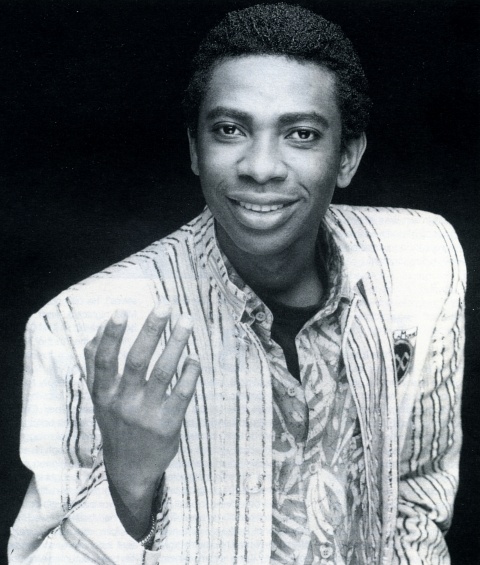Though he may have added media mogul, sometime politician and international human rights ambassador to his griot’s job description, Youssou N’Dour has made good on the clarion call of his classic and never bettered album Immigrés, namely, to remain connected to Senegal. Released in 1984, Immigrés is a letter home in song from a prodigal eldest son and N’Dour’s deeply personal response to first encountering the Senegalese diaspora living and working in Paris. At just 34 minutes long and with a cut to tape live energy, it remains one of the best albums of Youssou’s forty something career, and was the record that would bring him to the attention of early champion Peter Gabriel and the international music press.
Unlike his peers Papa Wemba, Mory Kanté, and Salif Keita, Youssou passed through Paris but never pitched his tent there. “I respect French culture, but I never felt Paris was the place for me to develop. There’s been too much between us“, he told British newspaper The Guardian in 2004.
It was the early eighties and the idea of World Music was gaining currency (and making it) in Paris and London as the young Youssou entered the studio. His rallying cry and the album’s concept would be a reassurance that the immigrés of the albums title would always be welcomed home to Senegal, and the four songs he hungrily committed to tape would counsel resilience, rootedness and return.

The album opens with the slinky guitar of the titular “Immigrés/ Bitim Rew” an uplifting, dance floor-filling shot of mbalax. Youssou’s voice parts the music like Moses parting the sea before taking flight over syncopated percussion, brass and keyboards. A quick word on those keyboards just for the geeks. Much as African guitarists from Kinshasa to Dakar favour the classic Roland Jazz Chorus amplifier, the keyboard of choice for mbalax musicians remains the Yamaha DX7, the workhorse of eighties power pop from Whitney to a-ha. The plucky marimba sound on the DX7 has arguably become folkloric in it’s own right and has remained an ingredient of Youssou’s music. As Youssou wrote in 1992 in a piece to mark ten years of WOMAD festival, “it is perfectly natural to weave new elements from the vocabularies of other musics amongst the strands of our age-old cultural legacies.” Indeed the opening track of this classic album has it all, funk, rock, and the wobbly bounce of mbalax that should leave no-one in doubt that reggae, like so many diasporic musics, arrived from Africa.
Watch Youssou and his then band Super Etoile de Dakar perform the title song in Athens (released in 2015 as the live concert album Fatteliku) for a sense of the camaraderie of Youssou’s band and a souvenir of the late Habib Faye, Youssou’s long term arranger / producer, who passed away before his time in in 2018.
The reflective focus of Immigrés continues on “Pitche Mi.” The allegory of a newborn bird who declines the offer of a crocodile to babysit until it’s mother returns, the song is a cautionary fable advising African leaders to interrogate Western Aid. In vocal delivery and social commentary the song sees Youssou playing the griot. Indeed, although Youssou belongs via his maternal lineage to the guild of the griot, it has never been his main selling point in the reductive way in which African music has at times been marketed. All the same, as the Senegalese architect and filmmaker Nicholas Cissé has said “there is no such thing as a minor griot.”
If Youssou is synonymous with something it is mbalax. A full band transposition of Serer drumming, mbalax is built up around the Sabar drum played with one hand and one acacia stick. In mbalax the polyrhythms traditionally played by this family of drums are shared out between the guitar, bass and keyboard and led by a sabar player who calls breaks consisting of extended rhythmic phrases. This is deftly demonstrated on “Taaw” the exhilarating 3rd cut on Immigrés. Accompanied by the chatter of sabar and tama (the small talking drum squeezed under the arm and played with a hooked stick) Youssou sings of the responsibilities of a “taaw” the eldest child in Senegalese family life. A third parent of sorts, Youssou sings from personal experience of the special responsibilities of eldest child. The clamour of the sabar and tama on “Taaw” evoke the bustle of Dakar. Where other bands of the time such as the gentlemanly Orchestra Baobab used Afro-Cuban percussion such as congas and Timbales to coax and charm, the snap and crack of Sabar on `Taaw’ cry out. You can almost hear the Acacia sticks splinter.
The album concludes with an elegy. “Badou” is the familiar version of the name Badara, a helper of the prophet Mohammed, and the song is a homage to his namesake the late musician Badara Samb. A lilting triplet feel of synth and guitar, Youssou’s verses are answered by the plaintive saxophone of Rhane Diallo, whose imploring tone is sprinkled over the album.
The analogue warmth of Immigrés is undoubtedly part of it’s charm. In a decade where over-producing ruled (and dates albums of a similar vintage) immigrés sounds as fresh and urgent as it must have done on boom boxes in the foyers of Paris where it inspired pride and courage among the Senegalese diaspora.
Immigrés is a statement of intent. Ever the innovator, many years later Youssou would initiate Project Joko to open internet cafes across Africa and connect Senegalese communities around the world. This classic album announced Youssou to the world and shrunk distance for homesick Senegalese long before gmail or WhatsApp.
Listen to Immigrés on Spotify, Apple Music or YouTube.
